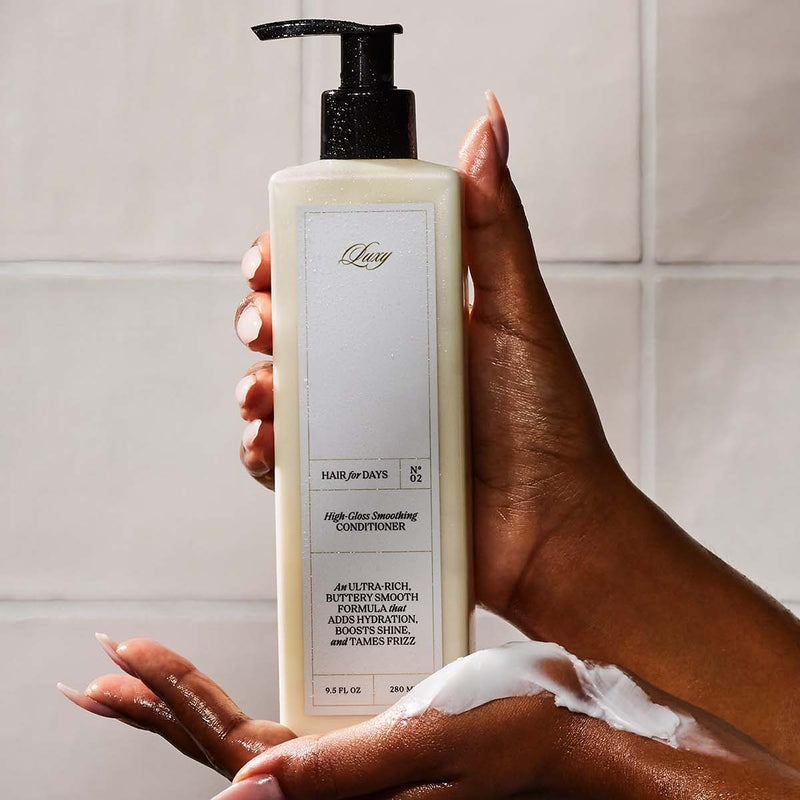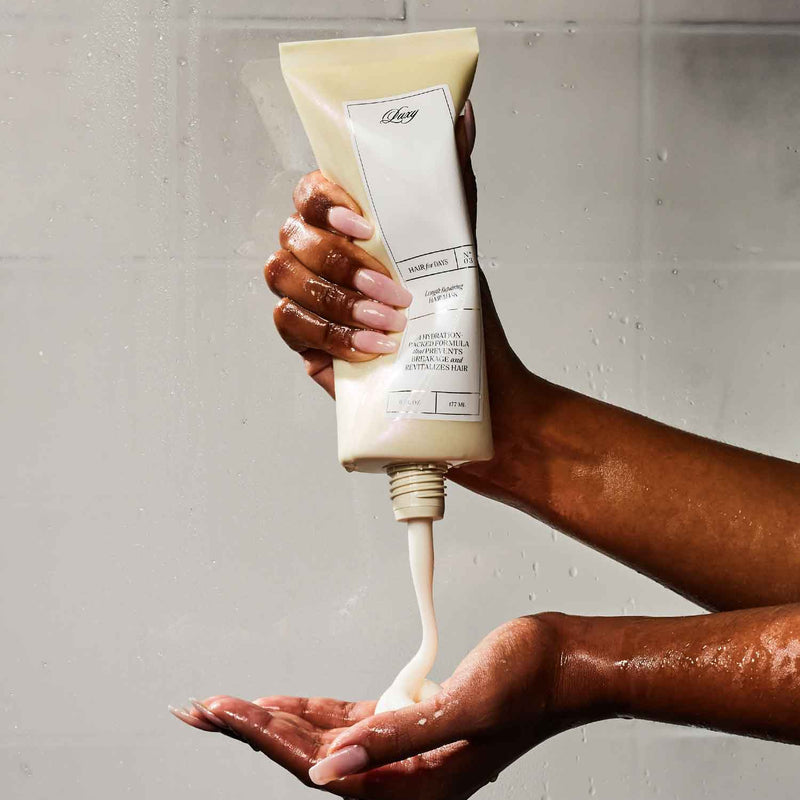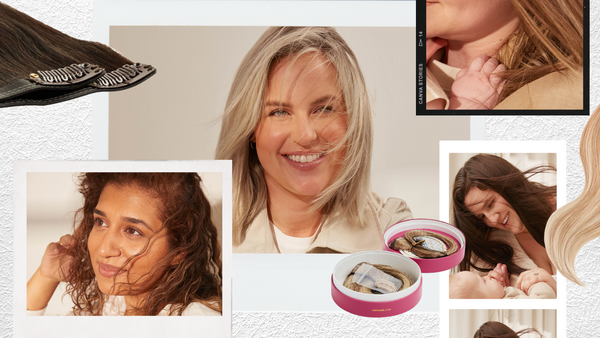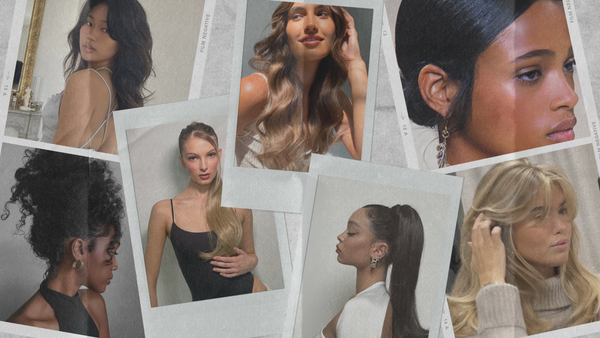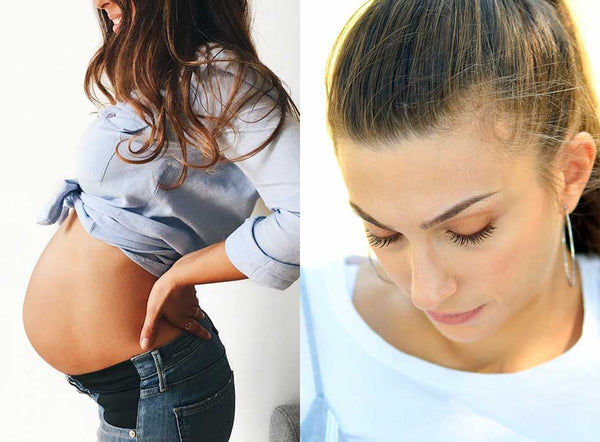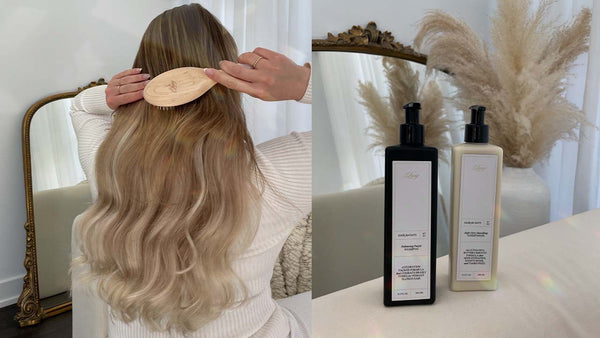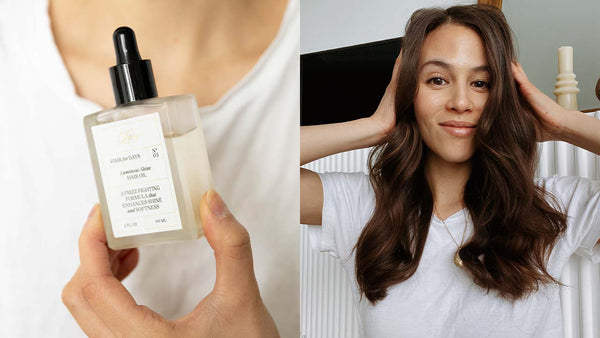Have you ever googled ‘how to get rid of dandruff’ while simultaneously panic-dialing your mom for dandruff-banishing home remedies? Yup, same. Trust us, we’re all in the same boat; one that is on the lookout for a solution that clears out every possibility of an irritable scalp with dandruff and replaces it with a healthy, nourished one. Dandruff can be an extremely embarrassing condition to deal with. Salon visits get awkward, you skip out on wearing darker colours, continuously feel self conscious...it can be quite uncomfortable, both physically and emotionally.

Getting rid of dandruff might be a longstanding problem for some, and a fleeting one for others, but that doesn’t take away from the fact that this condition can get difficult to deal with. Especially when advertisements on television are selling you anti-dandruff shampoos left, right and center, your Aunties are showing you several different DIY fixes to dandruff and your friends are recommending Reiki (yes, you can try Reiki to get rid of dandruff).
There are way too many cures offered to you faster than you can say, “dandruff sucks!” Which, IMHO, is where all the confusion begins. In order to deal with this immensely prevalent scalp condition (over 50 million people in America are affected by it, yikes!), it is absolutely essential that we start from the ground up.

So, what is dandruff?
Most adults have a yeast called malassezia present on their scalp. Along with this, your hair follicles and oil glands naturally produce an oil called sebum. You might recognize this oil as the third-day grease that many of us dry shampoo away on days we don’t want to wash our hair. Dandruff occurs when excess production of this oil (sebum) reacts with the malassezia (yeast) present on your scalp, causing it to multiply rapidly, resulting in an itchy, inflamed, irritable scalp. If not taken care of properly, this can lead to more serious skin conditions like psoriasis, which is a whole different ball game.
An important thing to note here, is that while dandruff is a condition that predominantly affects the scalp, it also has a tendency to spread to other parts of your body. For example, places like your eyebrows, behind your ears, on the sides of your nose, and even on the chest (for men) are common areas where this condition could also occur.
Simply put, dandruff is a reaction caused because of the increased production of oils and yeast that are already present on your scalp. This could happen due to a number of reasons ranging from hormones to stress, your environment, the weather and more. But before we jump into what causes dandruff, it is important that we clarify a common misconception we all have had surrounding dandruff. We often mistake dandruff for a dry scalp (or vice-versa) and begin to treat it without understanding what the problem even is.
Dry Scalp vs. Dandruff: What is the difference?
Finding dry flakes on your pillow when you wake up or feeling a constant itch on your scalp are a few commonalities these two conditions share. And because of this largely evident symptom, a lot of us easily assume that it is dandruff—but that isn’t always the case.
A dry scalp is caused due to the lack of moisture and oil. Because there is a lack of naturally nourishing components, the scalp does not have enough oil for the skin to feel lubricated, which causes an inflamed scalp that is itchy and irritated. It can also make your hair look dull and dry.
Now you may ask, “But what about the flakes? Isn’t that a sign of dandruff?” Well, because of lack of naturally nourishing components, the scalp tends to become dry and creates flakes of dead skin on your scalp. So the flakes you see falling on your favorite black sweater is nothing but dead skin.
Dandruff flakes look different from dry skin flakes, so, one of the ways you can identify what scalp condition you might be suffering from is to see what the fallen flakes look like. To put it simply, you can look at it like this:
|
Condition |
Cause |
Symptom |
|
Dry Skin |
Undernourished scalp |
Dry white flakes |
|
Dandruff |
Excessive production of oils |
Oily yellow-tinted flakes |
While a dry scalp can happen due to a number of reasons, the weather being a considerable one, it rarely ever leads to a more serious condition. Whereas if you have dandruff, and it is not taken care of in the proper way, it could lead to more serious skin conditions.

Who is prone to dandruff?
There is no age factor to consider when we talk about the possibility of dealing with the monstrous condition that dandruff is. Whether we’re talking about a baby who is just a few months old or someone in their 80’s, dandruff can happen to anyone, and we mean anyone.
When we take into account gender, however, things look a little different. According to a research conducted by Unilever on Hair, Scalp and Gender, studies found that men are more likely than women to have dandruff. The study stated that the levels of sebum production were 1.5 times higher in men than in women making them more susceptible to having dandruff.
What causes dandruff?
Dandruff can happen to anyone, but there are certain habits, environments and situations that can trigger this condition further. If you’re suffering from those dreaded flakes, your next step would be to identify what is causing dandruff and/or what factors in your life are triggering it further. Once you successfully identify the cause, you can treat it in the most suitable way.
Hair washing
When you don’t wash your hair on a regular basis, the sebum (the oil your scalp naturally produces) can rapidly increase on the scalp causing dandruff. That is why it is essential to schedule your hair wash days on a regular basis. It is important to note the word ‘regular’ here, because if you overwash your hair, it could dry out your scalp further, and that’s not a good thing either. It’s all about finding that sweet spot just enough to keep your scalp nourished.
Diet
We’re not saying that your diet is causing dandruff, but rather that the foods you are consuming may not be helping your body fight or heal it to a certain degree. For example, dandruff is often connected to the Candida yeast. Foods high in sugar encourage the overgrowth of this yeast while also depleting the body of vitamin B, a vitamin which helps fight dandruff. Full-fat dairy products like cheese can also increase the growth of this yeast on your scalp resulting in dandruff. Because there is an indirect correlation between your diet and dandruff, switching up your diet to foods high in zinc and iron will help your body fight off and neutralize the growth of the white stuff.

Stress
Constant stress can not only have adverse effects on your mental and emotional health, but physical as well. We’re all aware of some of the common effects that stress can have on your body like poor sleep patterns, headaches, and chest pain—dandruff, believe it or not,is one of them. When your body is under stress your immune system is impaired, which leads to the development of dandruff. When your mind is in overdrive, it weakens the body’s natural defenses, making it difficult for your body to naturally fight back any effect dandruff has on you. You may even find yourself feeling continuously irritated because of the inflammation on your scalp, sometimes triggering an itch-cycle that leaves your scalp sore. While using the right shampoos and conditioners will help solve this problem, de-stressing is just as important. Put your phone on DND, run a bath, light a few lavender-scented candles, indulge in a good book or simply sleep in a little extra. A little de-stressing goes a long way for the health of your body and mind.
Hormones
Hormones are a key part of producing the natural oils you need to keep your scalp nourished. They keep your hair and scalp moisturized which helps keep dandruff at bay. We understand that hormones are something that one cannot control, but it is good to understand how changes in hormone levels during puberty, pregnancy, or menstruation can sometimes aggravate your dandruff. A hormone imbalance can cause your body to produce excess oil that can accelerate the production of dandruff on your scalp. While we cannot control our hormones, but you can control the excess production of the oil by controlling your diet. (See: Change Your Diet)
Genetics
Dandruff does tend to run in families—what this essentially means is that dandruff isn’t hereditary but rather makes one more susceptible to dandruff than others. When you are genetically susceptible to dandruff you may not be able to prevent it from happening but if you practice good skin and hair hygiene, you could successfully prevent it from rearing its ugly head too often.
Reaction to products
It is important to be aware of the kind of products and ingredients that we use on our bodies. Dandruff can get triggered due to the presence of some sulfates in shampoos and even due to the product build up from leave-in conditioners, hairspray, or hair serums, causing irritation to the scalp. So, while shampooing all the products away is important, it is equally important to use products that don’t cause harm in the first place.

The environment
If none of the causes that we mentioned above fit the ‘why’ you are suffering from dandruff, you might want to consider the environment that you live in as another factor. The appearance of dandruff is known to be more prevalent in the winter months when the air is dry and the humidity is low. Over and above that, if you are wearing hats (that are essential when it’s -21 degrees outside) it does block out air from reaching the roots of our hair which leads to the accumulation of natural oils leading to dandruff.
What are the remedies for dandruff?
Getting rid of dandruff isn’t as easy as growing out a broken nail or dealing with a pimple (PSA: stop picking!). This kind of condition is one that needs continuous, persistent care. So let’s begin by first realigning our minds to the fact that one can never really get rid of dandruff but rather just control it. There is no known “cure” for dandruff and the quicker we realise that, the quicker we’ll be on our way to a healthier scalp.
Many of us don’t realise this but our scalp is an extension of the skin on our face. Yes, the skin cells and components that it is made of are different, but we often fail to take care of our scalp the way we’d take care of our facial skin. We go all out with extravagant 63-step skincare routines while keeping your hair care on the back burner with the bare minimum of shampooing and conditioning.

Here are a few ways you can subside your dandruff and improve the health of your scalp:
Change your hair care routine
Find a shampooing schedule that doesn’t dry out your scalp and also doesn’t leave it looking oily and dirty. While we can recommend washing your hair three times a week, it all depends on you, your hair type and your environment. Through the process of trial and error, you will be able to find that shampooing sweet spot we were talking about earlier. We’d recommend looking for ingredients like zinc pyrithione, selenium sulfide, and zinc carbonate in your shampoo that will help subside the dandruff. Using a clarifying shampoo occasionally can help get rid of build up and flakes.
Use products with the right pH level
pH from 0 to 7 is acidic and from 7 to 14 is alkaline. When the pH is acidic it has the ability to kill unwanted yeast and stunt the growth of it, as bacteria cannot breed in an acidic environment. Most shampoos and hair care products sold over the counter are alkaline which could possibly aggravate your skin and hair further. While it might not have an immediate effect, continued use of alkaline products can result in the damage of your scalp, hair follicles and hair as well.
Unfortunately, not all shampoos come with their respective pH levels written on the bottle, so our best advice would be to do a thorough research before you buy the most popular anti-dandruff shampoo in the market. Moreover, you can also purchase pH strips on Amazon to check the pH level of your shampoo before using it.

Change Your Diet
Yeast-heavy and sugar-heavy foods can cause dandruff to flare up. We’re not asking you to cut these elements out of your diet completely but rather control your intake of them. Instead you can opt for food items high in omega 3 and omega 6 fatty acids, zinc and protein, as these will help strengthen your immune system and help fight off the growth of unwanted bacteria. Some foods that you can incorporate into your diet are, avocado, walnuts, salmon, flaxseeds, peanut butter. Doesn’t sound too difficult to do, right? Along with this, consciously adding fresh fruits and vegetables to your meals daily will also help booth the nourishment of your scalp.
Exfoliate your scalp
Contrary to popular belief, a hot oil massage is not the most ideal way to control the rapidly growing dandruff on your scalp. Especially because the very reason we suffer from dandruff is due to the excess production of oil. Exfoliation helps in removing any product or natural oil build up one might have. Swap your regular pre-shower hair brush out for an exfoliating brush or scalp massager that will not only help get rid of build up but also increase the blood circulation on your scalp. When buying a scrub, you’ll want to look out for ingredients like apple cider vinegar, seasalt, aloe vera and avocado out as they help clarify and deep-clean build up and keep the pH levels on your scalp balanced. An apple cider vinegar hair rinse can also help with build up.

DIY Home remedies
When products and popular shampoos just don’t seem to work going au naturel could be your only hope. A few natural do-it-yourself home remedies have proven to decrease scalp inflammation and help control dandruff, but that being said, each one of our bodies are different and can react to natural products differently. We recommend doing a patch test before fully applying these home remedies to make sure your body doesn’t have any adverse reactions.
Aloe vera gel + Tea Tree oil
- Take a fresh leaf of aloe vera and scoop out the gel.
- Run it in a blender until the consistency is even
- Add a few drops of Tea Tree oil
- Apply to your scalp and leave it on for 20-30 minutes.
- Wash off with warm water
Egg White + Olive Oil
- Separate the egg yolks and add 2 tablespoons of olive oil
- Apply to your scalp and let it air dry for 30 minutes
- Wash off with warm water
Lemon + Yogurt
- Mix 2 tablespoons of unflavoured yogurt with a tablespoon of freshly squeezed lemon juice.
- Apply gently onto your scalp.
- Wash off with a mild shampoo.
Along with these home remedies for dandruff, apple cider vinegar, garlic, and baking soda are largely popular ingredients to get rid of dandruff, however, can be harsh on your scalp. If you do choose to take the DIY route, be sure to check for allergies, reactions or sensitivities to any natural ingredients as well.
Hair Masks
Another way to build scalp strength and nourishment is by using hair masks that help lock in the moisture in your hair and scalp. Like we talked about earlier, keeping your hair fully healthy and nourished needs more than your run-of-the-mill drugstore shampoo and conditioner. Using a repairing hair mask once every week, and reduce the frequency when you see a visible improvement.
If all else fails, visit a doctor
If after many attempts at anti-dandruff shampoos, do-it-yourself methods and scalp and hair care products your dandruff doesn’t subside, visit your doctor immediately. Dandruff isn’t a life-threatening condition but that doesn’t mean you shouldn’t seek immediate help. A specialist would be able to correctly diagnose your skin condition and recommend a remedy better than any of your google searches. Like we said before, trust us, we’ve been there.
Listen to your body...
We can’t stress enough on how important it is to listen to your body!
- If a product doesn’t feel right, stop using it.
- If a particular food is causing you discomfort, stop eating it.
- If your body is reacting to the environment that you’re in, see what you can do to change your environment.

If you are blindly following age-old methods of dandruff prevention and removal without understanding how they affect your body, or using products only because they are popular in the market, stop! It might take some trial and error to figure out what works for you personally, but don’t give up. Controlling your dandruff is never a one-wash solution but one that takes time and needs persistent care. Pay attention and listen to how your body reacts to any product or DIY method you use. This is a small but effective way in which you can lead yourself to a healthier, nourished scalp, with the added benefit of emotional and mental peace of mind.
We hope we helped you understand the A-Z of dandruff, its causes and remedies. What has your experience with dandruff been? We’d love to hear about your journey—the products you used, remedies that worked for you and even the ones that didn’t. We’d love to hear about them all. Tell us right here in the comments below!





